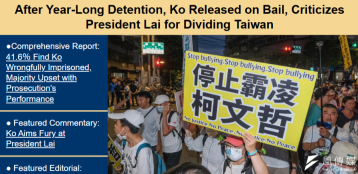
41.6% Find Ko Wrongfully Imprisoned, Majority Upset with Prosecution's Performance
Ko Wen-je, former Taipei mayor and former chairman of the Taiwan People’s Party (TPP) accused of corruption in the Living Mall case, had been detained for a full year before finally being released on September 8 with an unprecedented NT$70 million (approximately US$2.3 million) bail. He fiercely criticized the judiciary, insisting the case was a wrongful imprisonment: “Why let the entire nation fall into division? Lai Ching-te, think carefully!” He declared he would never surrender, never bow down.
...read more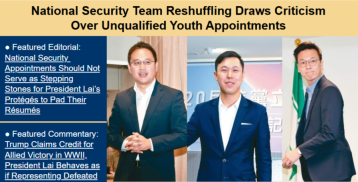
National Security Appointments Should Not Serve as Stepping Stones for President Lai's Protégés to Pad Their Résumés
The Office of the President recently announced that Deputy Secretaries-General Hsu Ssu-chien and Liu Te-chin of the National Security Council (NSC) will assume new roles as senior advisors, while Taipei City Councilor Vincent Chao and Spokesman Lii Wen of the Office of the President will become NSC deputy secretaries-general, effective immediately. Together with incumbent Deputy Secretary-General Lin Fei-fan, all three are under 37, a youthful shift that has drawn attention. While granting opportunities to younger generations is commendable, the deputy secretary-general position—tasked with involvement in defense, diplomacy and cross-strait policy—is significant, and should not serve as a sinecure for political patronage or a mere stepping stone for political résumé-building.
...read more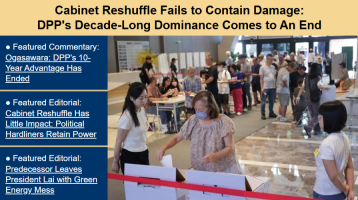
Ogasawara: DPP's 10-Year Advantage Has Ended
With the conclusion of the August 23 vote, the entire recall movement finally came to an end. In the first wave of recall cases on July 26, all 25 legislators successfully survived the crisis. On August 23, the recall cases targeting seven Kuomintang (KMT) legislators also all failed to pass. At the same time, the referendum on restarting the Third Nuclear Power Plant, which concerns both power supply stability and national security, ultimately did not pass. According to Japanese scholar Chair Professor Emeritus Ogasawara Yoshiyuki of National Tsing Hua University, the vote results show that the two major banners which had supported the Democratic Progressive Party’s (DPP) advantage over the past 10 years—“Resisting China and Protecting Taiwan” and “A Nuclear-Free Homeland”—are weakening in effectiveness.
...read more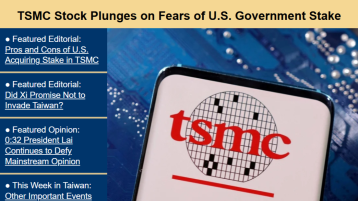
Pros and Cons of U.S. Acquiring Stake in TSMC
The Trump administration is considering converting subsidies under the CHIPS and Science Act for Intel and the Taiwan Semiconductor Manufacturing Company (TSMC) into equity stakes—a move that has unsettled investors and rattled markets. However, based on the subsidy amount and TSMC’s market capitalization calculated from its current American Depositary Receipt (ADR) price, even if the full US$6.6 billion subsidy were converted into equity, the U.S. government would hold only about 0.7 percent. Such a limited stake would neither influence the board of directors nor affect management decisions. From the standpoint of actual control, this amounts to symbolic shareholding rather than control.
...read more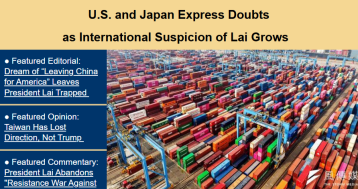
Dream of “Leaving China for America” Leaves President Lai Trapped
After the United States announced a 20-percent reciprocal tariff on Taiwan, it went further by imposing a 100-percent tariff on semiconductors. President Lai Ching-te claimed the 20-percent levy was only “temporary,” yet the Office of Trade Negotiations, Executive Yuan, confirmed that the 20 percent would be added on top of existing tariffs. The Lai administration kept the public in the dark, while the Democratic Progressive Party (DPP) continued to chant slogans about “Taiwan and the United States getting rich together.” On the one hand, the government struggles within the black box of U.S.-Taiwan negotiations; on the other, it longs for American favor. U.S. President Donald Trump’s tariff stick appears not to have shaken President Lai’s “decouple from China, embrace America” dream awake.
...read more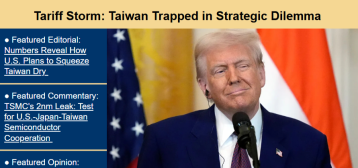
Numbers Reveal How U.S. Plans to Squeeze Taiwan Dry
In the foreseeable future, Taiwan will face a grueling and drawn-out tariff negotiation with the United States. A glance at a few key figures reveals that Washington’s demands on Taiwan amount to what can only be described as harsh and outrageous. Ultimately, both the government and the public must confront a single question: How high a price is Taiwan willing to pay in exchange for a U.S.-granted tariff rate of 15 percent?
...read more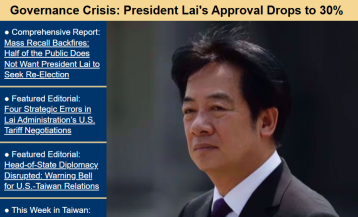
Mass Recall Backfires: Half of the Public Does Not Want President Lai to Seek Re-Election
The Democratic Progressive Party (DPP) has been severely impacted by its recent recall campaign failure, with multiple new polls showing a steep decline in public support for President Lai Ching-te. According to the latest data, President Lai’s approval rating dropped by 10 percentage points in July to around 30 percent, while disapproval surged past 50 percent, also up by 10 points. Public trust in President Lai fell to just 30 percent, and nearly half of respondents opposed his re-election.
...read more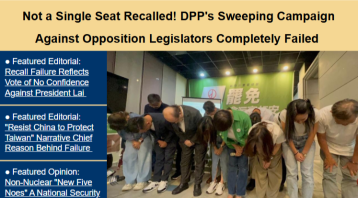
Recall Failure Reflects Vote of No Confidence Against President Lai
The aggressive recall campaign orchestrated by the ruling Democratic Progressive Party (DPP) came to a dramatic and moving end yesterday, marked by complete failure—not a single legislator was successfully recalled. The most crucial factor behind this unexpected outcome was the surge of silent voters who turned out en masse to cast “no” votes against the recall, effectively thwarting the Lai administration’s attempt to consolidate power through questionable means. The message sent by these outraged citizens was loud and clear—a resounding rebuke to the government. Can President Lai Ching-te and Premier Cho Jung-tai really pretend they didn’t hear it?
...read more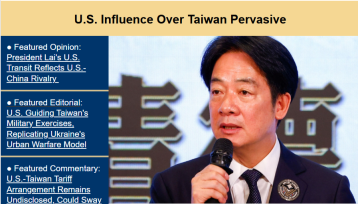
President Lai's U.S. Transit Reflects U.S.-China Rivalry
While visiting diplomatic ally Paraguay on July 14, Minister of Foreign Affairs Lin Chia-lung revealed that the South American country is eagerly preparing to receive President Lai Ching-te within the next 30 days. The remarks inadvertently disclosed President Lai’s upcoming overseas itinerary. Media reports suggest that in addition to Paraguay, President Lai will also visit Taiwan’s diplomatic allies Guatemala and Belize, with a significant stopover in the United States.
...read more
Why Taiwan Businesses Can't Trust Government's Negotiations with the U.S.
The United States has recently announced its reciprocal tariff rates for various countries, including Japan and South Korea, while the outcome of U.S.-China tariff talks is largely settled. Compared to the transparent and public negotiation focus seen with China, Japan, and South Korea—where businesses can clearly identify the key issues behind the imposed rates—Taiwan’s talks with the United States over the past three months have been conducted in complete secrecy. If the final reciprocal tariff rates fall short of expectations, then Taiwanese businesses may be left lamenting a senseless loss.
...read more